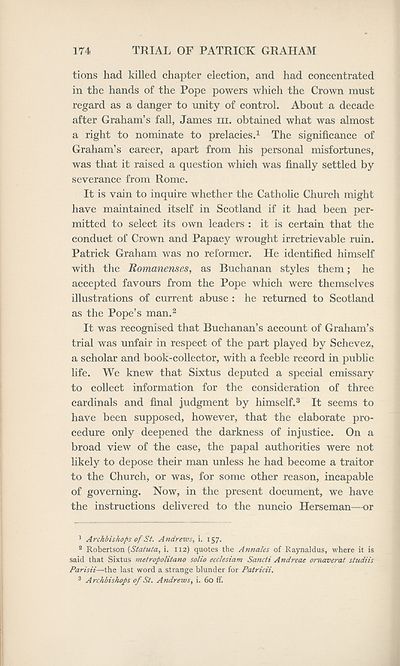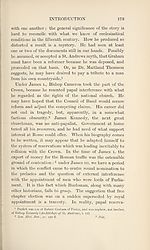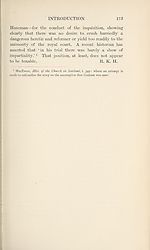Series 2 > Miscellany of the Scottish History Society
(191) Page 174
Download files
Complete book:
Individual page:
Thumbnail gallery: Grid view | List view

174
TRIAL OF PATRICK GRAHAM
tions had killed chapter election, and had concentrated
in the hands of the Pope powers which the Crown must
regard as a danger to unity of control. About a decade
after Graham’s fall, James in. obtained what was almost
a right to nominate to prelacies.1 The significance of
Graham’s career, apart from his personal misfortunes,
was that it raised a question which was finally settled by
severance from Rome.
It is vain to inquire whether the Catholic Church might
have maintained itself in Scotland if it had been per¬
mitted to select its own leaders : it is certain that the
conduct of Crown and Papacy wrought irretrievable ruin.
Patrick Graham was no reformer. He identified himself
with the Romanenses, as Buchanan styles them; he
accepted favours from the Pope which were themselves
illustrations of current abuse : he returned to Scotland
as the Pope’s man.2
It was recognised that Buchanan’s account of Graham’s
trial was unfair in respect of the part played by Schevez,
a scholar and book-collector, with a feeble record in public
life. We knew that Sixtus deputed a special emissary
to collect information for the consideration of three
cardinals and final judgment by himself.3 It seems to
have been supposed, however, that the elaborate pro¬
cedure only deepened the darkness of injustice. On a
broad view of the case, the papal authorities were not
likely to depose their man unless he had become a traitor
to the Church, or was, for some other reason, incapable
of governing. Now, in the present document, we have
the instructions delivered to the nuncio Herseman—or
1 Archbishops of St. Andrews, i. 157.
2 Robertson (Statutes, i. 112) quotes the Annales of Raynaldus, where it is
said that Sixtus metropolitano solio ecclesiam Sancti Andreae omaverat studiis
Parisii—the last word a strange blunder for Patricii.
3 Archbishops of St. Andrews, i. 60 ff.
TRIAL OF PATRICK GRAHAM
tions had killed chapter election, and had concentrated
in the hands of the Pope powers which the Crown must
regard as a danger to unity of control. About a decade
after Graham’s fall, James in. obtained what was almost
a right to nominate to prelacies.1 The significance of
Graham’s career, apart from his personal misfortunes,
was that it raised a question which was finally settled by
severance from Rome.
It is vain to inquire whether the Catholic Church might
have maintained itself in Scotland if it had been per¬
mitted to select its own leaders : it is certain that the
conduct of Crown and Papacy wrought irretrievable ruin.
Patrick Graham was no reformer. He identified himself
with the Romanenses, as Buchanan styles them; he
accepted favours from the Pope which were themselves
illustrations of current abuse : he returned to Scotland
as the Pope’s man.2
It was recognised that Buchanan’s account of Graham’s
trial was unfair in respect of the part played by Schevez,
a scholar and book-collector, with a feeble record in public
life. We knew that Sixtus deputed a special emissary
to collect information for the consideration of three
cardinals and final judgment by himself.3 It seems to
have been supposed, however, that the elaborate pro¬
cedure only deepened the darkness of injustice. On a
broad view of the case, the papal authorities were not
likely to depose their man unless he had become a traitor
to the Church, or was, for some other reason, incapable
of governing. Now, in the present document, we have
the instructions delivered to the nuncio Herseman—or
1 Archbishops of St. Andrews, i. 157.
2 Robertson (Statutes, i. 112) quotes the Annales of Raynaldus, where it is
said that Sixtus metropolitano solio ecclesiam Sancti Andreae omaverat studiis
Parisii—the last word a strange blunder for Patricii.
3 Archbishops of St. Andrews, i. 60 ff.
Set display mode to:
![]() Universal Viewer |
Universal Viewer | ![]() Mirador |
Large image | Transcription
Mirador |
Large image | Transcription
Images and transcriptions on this page, including medium image downloads, may be used under the Creative Commons Attribution 4.0 International Licence unless otherwise stated. ![]()
| Scottish History Society volumes > Series 2 > Miscellany of the Scottish History Society > (191) Page 174 |
|---|
| Permanent URL | https://digital.nls.uk/127193697 |
|---|
| Attribution and copyright: |
|
|---|
| Description | Over 180 volumes, published by the Scottish History Society, containing original sources on Scotland's history and people. With a wide range of subjects, the books collectively cover all periods from the 12th to 20th centuries, and reflect changing trends in Scottish history. Sources are accompanied by scholarly interpretation, references and bibliographies. Volumes are usually published annually, and more digitised volumes will be added as they become available. |
|---|


